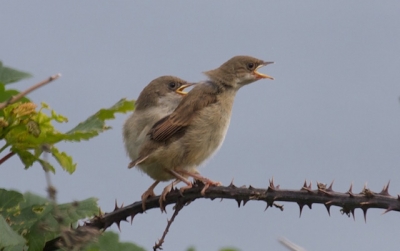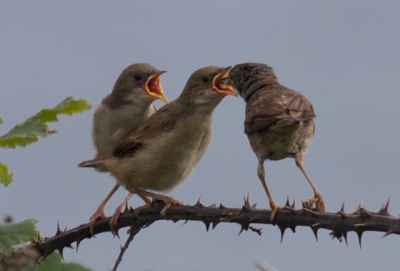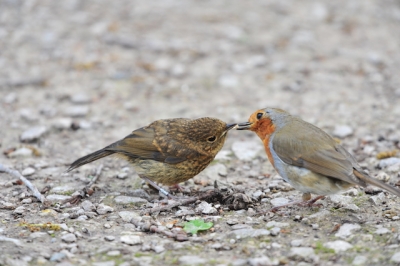Right now hedges, trees, heath and grassland as well as nestboxes are all of a flutter as the breeding season gets into full swing. Birds are busy diving into all manner of hidey holes and secret places, beaks packed with insect food for their hungry chicks. Egg-laying season is typically between late March and May, although some species can have many broods with chicks into August. For a small garden bird such as the greenfinch, it can take over two weeks for the eggs to hatch and a further two-three weeks for the chicks to fledge the nest. Just before baby birds are ready to tentatively extend a wing, wiggle a tail feather and take flight for the first time, they leave their nest or fledge. Fledglings then spend a couple of days on the ground developing their final flight feathers.
 |
 |
The fledglings will appear fully feathered (with perhaps some downy fluff here and there) and spend these days hopping around in broad daylight – hence why so many members of the public are convinced they need rescuing.
Another common fear is that the fledgling has been deserted by its parents. However, fledglings are extremely unlikely to be abandoned. Mum and dad are probably off gathering food, or more likely hiding nearby with a beady eye on their young, waiting for you to back away. Parents know best and are more than capable of looking after their own.
Removing a fledgling from the wild significantly reduces its chances of long-term survival – so please don’t ‘kidnap’ the baby bird. There are only a couple of situations when the public should lend a friendly helping hand:
- Immediate Danger
If the baby bird is found on a busy road or path, it would then be advised to pick the bird up and move it a short distance to a safer place - this must be within hearing distance of where the fledgling was found. Similarly, if you discover your cat or dog eyeing up a fledgling in your garden we recommend that you endeavour to keep your domestic pet indoors for a couple of days – or at least around dawn and dusk. - Injury
If an injured fledgling is discovered this should be reported immediately to the RSPCA on: 0300 1234 999. Sometimes local vets treat wild birds for free, but please check with them first. - Nestlings
If a baby bird is discovered on the ground that is either unfeathered or covered only in its fluffy nestling down, it has likely fallen out of its cosy nest ahead of schedule. Very occasionally it is possible to put these babies back in their nest, but only if you are 100% positive of the nest it has fallen from.
It is also important to remember that sometimes a parent bird will intentionally eject a chick from the nest if they sense it has an underlying health problem or is dying. It’s a harsh truth to stomach, as humans we want to fix things, but sometimes we need to allow nature to run its full circle. - Ground nesting birds
When out walking at this time of year it is best to stay on well used footpaths to avoid accidentally disturbing ground-nesting species like skylarks and pipits. Have your dog under close control, it might be having fun leaping around in the long grass or heathland, but it’s not much fun for the small birds trying to raise their broods.
Published: May 2016
Author: Claire Mucklow (RSPB Cornwall Project Manager)
